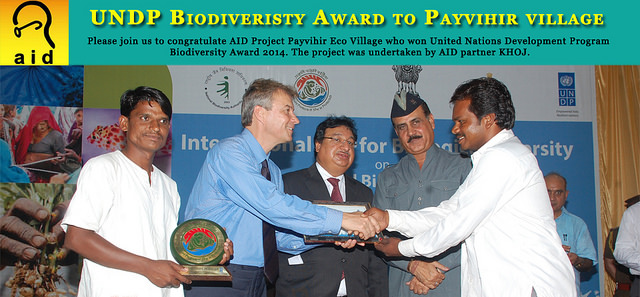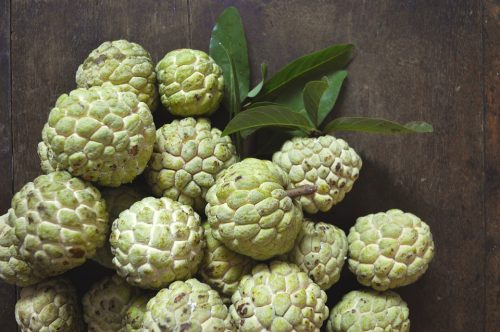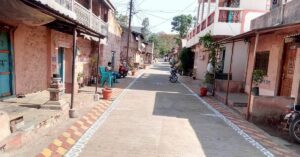From Growing Its Own Forest to Selling Organic Fruits, This Village Funds Its Own Development
Encouraged by the NGO Khoj, the villagers of this tribal hamlet in Maharashtra embraced the spirit of the contentious Forest Rights Act, 2006, and forged an incredible uplifting story of community conservation.

An obscure village in the foothills of Melghat region of Amravati district in Maharashtra, Payvihir, has set an example for the country by consistently showing how communities and NGOs can work together to conserve the environment and ensure sustainable livelihood for people.
In 2014, Payvihir bagged the Biodiversity Award from the United Nation’s Development Programme (UNDP) for turning a barren, 182-hectare land under community forest right (CFR), into a forest. In 2015, the village was honoured with the Maharashtra Wildlife Service Award presented by Sanctuary Asia in recognition of its invaluable contribution to environmental conservation in the state. Recently, the village also come up with an out-of-the-box idea of selling organic sitafals (custard apples) in Mumbai under their brand “Naturals Melghat”!
Here’s how the villagers of Payvihir, encouraged by the NGO Khoj, embraced the spirit of the contentious Forest Rights Act, 2006, and forged an incredible uplifting story of community conservation.

Photo Source
In 2012, Payvihir was awarded 182 hectares of degraded land to exercise its community forest rights under the Forest Rights Act (FRA) 2006. Encouraged by Purnima Upadhyay of the NGO Khoj, the gram panchayat of Payvihir decided to devote its energies to regenerate and revive the forest biodiversity of the area.
Villagers undertook soil and water conservation works, plantations, and protection from forest fires and grazing. They also ensured a mix of natural regeneration and afforestation.

Photo Source
Problems like unemployment and migration were tackled by providing village development jobs to the locals under MNREGA. All the works were carried out as per the micro plan prepared by Khoj. The forest secretary Praveen Pardeshi also provided technical and financial support.
By 2015, a flourishing forest stood in place of the 182 hectares of degraded land that the village was handed as part of their Community Forest Rights. This attracted herbivores like deer, wild boars, and sambars to the area. Bird nests, which were never seen earlier, also came up in the forests. Today, there are also carnivores like jackals and hyenas in the habitat, which is protected day and night by the villagers.
Afforestation and regeneration of lost flora and fauna also led to better livelihoods, and improved governance of the village. All of this was taken into consideration by the UNDP when they decided to bestow their Biodiversity Award on Payvihir. The award carried a cash prize of Rs 1 lakh and a citation.

Photo Source
Along with this money, the village used funds from the tribal welfare department to set up a biogas plant that supplies biogas for three hours a day. The villagers sell cow dung to the plant at the rate of 75 paise per kg and also buy gas from the plant by paying ₹200 per month.
Next, Payvihir installed a solar drip irrigation system on forest land, becoming the first village to do so. Soon after, the villagers planted medicinal plants on 4 hectares of the land. To increase tree diversity, the villagers have started organic plantations of bamboo, sitaphal, hirda, behada, mahua, mango, neem, custard apple, amla, jamun, teak and arjuna trees.
Teak will be used by the villagers themselves while organic mango and sitaphal will be sold to larger markets. Collection of tendu leaves and procurement of milk buffaloes on a 50% subsidy from the forest department is also supplementing the income of the villagers. Additionally, one member of each village household is ensured a connection to a means of livelihood – from tendu leaf collection to sale of organic fruit from trees.
This season, Payvihir joined hands with three adjacent CFR villages — Khatijapur, Upatkheda and Kumbiwagholi — to sell 10 tons of sitafals under the brand Naturals Melghat, and recorded a turnover of ₹5 lakh.

Photo Source
In this endeavour, the village was helped by Khoj, which sponsored the cardboard packaging, and the tribal department, which provided accommodation in the city to the villagers.
Buoyed by the branding success, Payvihir now plans to sell organic farm produce (like wheat and jowar) as well as forest produce (like mahua and charoli) under its brand. As for its administrative earnings, the gram sabha of Payvihir has decided to utilise it for the development of health, education and sanitation facilities of the village. It has already ensured zero-waste generation in the village and sustainable employment opportunities for the village youth!
Payvihir’s astute management of natural resources and ability to collectively move forward in the process of forest regeneration and environmental conservation is the first effort of its kind in the entire nation after the enactment of the Forest Rights Act 2006. Together, the hard-working villagers of this little tribal hamlet (it got its name from an old stepwell in a farm) made barren hills green again.
For contact details, click here.
Also Read: This Man Left the Chaos of City Life Behind to Build an Organic Village in Kerala
Like this story? Have something to share? Email: contact@thebetterindia.
NEW! Log into www.gettbi.com to get positive news on WhatsApp.

Similar Story

How Women Turned A Tiny Village Struggling With Darkness Into A Solar Gram
Thirteen years ago, women in Manyachiwadi village of Maharashtra’s Satara district took the leap towards a more sustainable way of life. It was their money that sponsored the village’s transformation into a model ‘Solar Gram’.
Read more >
If you found our stories insightful, informative, or even just enjoyable, we invite you to consider making a voluntary payment to support the work we do at The Better India. Your contribution helps us continue producing quality content that educates, inspires, and drives positive change.
Choose one of the payment options below for your contribution-
By paying for the stories you value, you directly contribute to sustaining our efforts focused on making a difference in the world. Together, let's ensure that impactful stories continue to be told and shared, enriching lives and communities alike.
Thank you for your support. Here are some frequently asked questions you might find helpful to know why you are contributing?


This story made me
-
97
-
121
-
89
-
167












